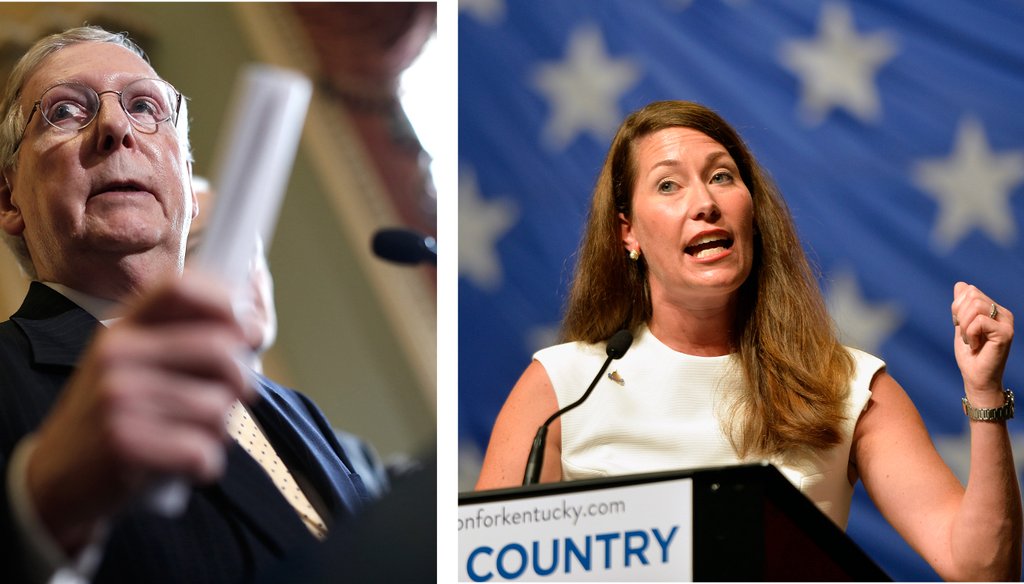Stand up for the facts!
Our only agenda is to publish the truth so you can be an informed participant in democracy.
We need your help.
I would like to contribute

Sen. Mitch McConnell, R-Ky., and Alison Lundergan Grimes, a Democrat, are engaged in a heated Senate race.
Editor’s note: Today we look at the race for U.S. Senate in Kentucky. It's the fifth in a series of stories about our fact-checks in closely contested Senate races. Our previous installments looked at the races in Alaska, Arkansas, Colorado and Iowa.
Mitch McConnell’s bid to become Senate majority leader begins by defending the Kentucky seat he has held for nearly 30 years.
McConnell, a Republican, has faced a spirited challenge from Democratic opponent Alison Lundergan Grimes, the Kentucky secretary of state. McConnell has held onto a slim but consistent lead in the race, coming out ahead in nearly every poll since the start of the year. But Grimes remains within striking distance, despite running in a state that gave 60 percent its presidential vote to Republican Mitt Romney two years ago.
What’s on the line? If McConnell holds on and Republicans add six seats this fall, he would be in line to become the next majority leader.
On its face, the optics of the race could not be more stark. At 72, McConnell is a seasoned Washington veteran with five campaigns under his belt. Grimes, meanwhile, is an accomplished woman and a legacy in Kentucky politics (her father was a former state party chair and representative) who was in elementary school when McConnell won his first race.
Sign up for PolitiFact texts
But in their appeal to Kentucky voters, there have been similarities as well. McConnell and Grimes have both claimed to oppose the White House on coal regulations. And each has wielded a gun at some point this campaign cycle.
McConnell and Grimes will debate Oct. 13, their only scheduled debate so far. The ads in the race so far may be an indication of what we’ll hear that night.
Grimes has been critical of McConnell’s lengthy tenure. One ad (erroneously) claimed that McConnell became a millionaire while in public office.
McConnell’s wealth grew to $22 million since his first term, making him the 10th richest senator in office. But his take-home pay and his private investments made up just a fraction that growth.
So what accounts for the increase in wealth? We found in McConnell's 2008 disclosure forms that he and his wife, former Secretary of Labor Elaine Chao, received a gift of between $5 million and $25 million after Chao’s mother died. This accounts for the bulk of the increase during that five-year period.
The ad strongly suggested that McConnell somehow managed to leverage his public office into personal riches. We rated this claim Mostly False.
For his part, McConnell has sought to tie Grimes to President Barack Obama, who has low approval ratings in the Bluegrass State, and to the Affordable Care Act.
Soon after winning his primary against Matt Bevin, McConnell ran an ad claiming that Grimes "supports Obamacare, which cuts $700 billion from seniors’ Medicare."
This is the claim that won’t die. We’ve heard it repeatedly in the 2012 presidential election, and it only tells half the story.
Grimes has been cautiously supportive of the Affordable Care Act, and she certainly does not oppose it as strongly as McConnell does.
As far as the impact to Medicare, the law is projected to reduce spending on Medicare by about $700 billion over 10 years, but those reductions in spending are more of a slowed growth rate rather than a budget cut.
It’s worth noting that the 2012 Republican budget championed by Rep. Paul Ryan, R-Wis., also trimmed future Medicare spending by almost exactly the same amount as the health care law. (And McConnell voted to consider Ryan’s plan in the Senate.) On balance, we said the claim was Half True.
Grimes ran her own Medicare scare ad as well. As part of a series of folksy ads featuring Kentucky residents, Grimes sat down next to Don Disney, a retired Kentucky coalminer, who had a question McConnell.
"I want to know how you could have voted to raise my Medicare costs by $6,000," says Don Disney. "How are my wife and I supposed to afford that?"
A long silence ensues as Grimes and Disney stare at the camera.
"I don’t think he’s going to answer that," Grimes offers.
The $6,000 figure cited in multiple studies measures a specific amount: The average out-of-pocket costs a new senior would pay in 2022 if Medicare changed to a more privatized system. People who turned 65 prior to 2022, like the retiree in Grimes’ ad, would remain in the current Medicare system and would not incur those costs.
Be wary of ads claiming a politicians is tampering with grandpa’s healthcare. We rated the claim False.
Then again, the message to middle-class voters is muddled as well. McConnell’s campaign claimed a report released in July showed the "devastating tax hikes (the implementation of the health care law) will have on middle-class Kentuckians."
The Congressional Budget Office, Congress’ top fiscal scorekeeper, released a report in July on the country’s long-term budget outlook, including its tax policy.
One interesting line mentioned the future impact of taxes — including some in the Affordable Care Act. Basically, some federal taxes in the healthcare law kick in when you reach a certain income level. These levels are not set to increase with inflation. So in 25 years, inflation will push some people past the threshold who, in today’s dollars, would not be required to pay those taxes.
However, we reviewed the analysis and found most of the middle class wouldn’t be affected, even 25 years from now. We rated the claim Mostly False.
For Grimes to top McConnell, she’ll need a strong turnout from female voters. With that in mind, her campaign has consistently criticized McConnell on women’s issue. In one ad, Grimes claimed McConnell voted "two times against the Violence Against Women Act."
However, this painted a limited picture of McConnell’s record on this particular legislation.
McConnell supported the act repeatedly when it was first introduced and when it first passed the Senate in the early 1990s, and twice voted to reauthorize it, including once while Republicans controlled the Senate.
While he voted against the Democratic versions of the bill in 2012 and 2013 that included new provisions for sexual orientation, immigration status and tribal lands (and eventually became law), he also voted for Republican measures that largely maintained the status quo.
We rated Grimes’ claim Half True.
McConnell’s response to this Grimes ad didn’t fair any better on the Truth-O-Meter. He claimed that by backing the Republican versions of the Violence Against Women Act, he "voted for even stronger protections than Obama’s agenda will allow."
The only part of the bill that was "stronger" were new mandatory minimum sentences for domestic abusers, a provision advocates of domestic abuse awareness didn’t even support. And the Republican measure was absent several protections for certain groups — homosexuals, illegal immigrants and American Indians — that were included in the bill Obama signed.
We rated McConnell’s statement Mostly False.
The only True statement we’ve rated in the race so far was an early claim from Grimes that McConnell is "the No. 1 recipient of contributions from lobbyists this cycle." That claim was accurate in March when it was made, but it no longer holds water; McConnell is now fourth in that category.
















































